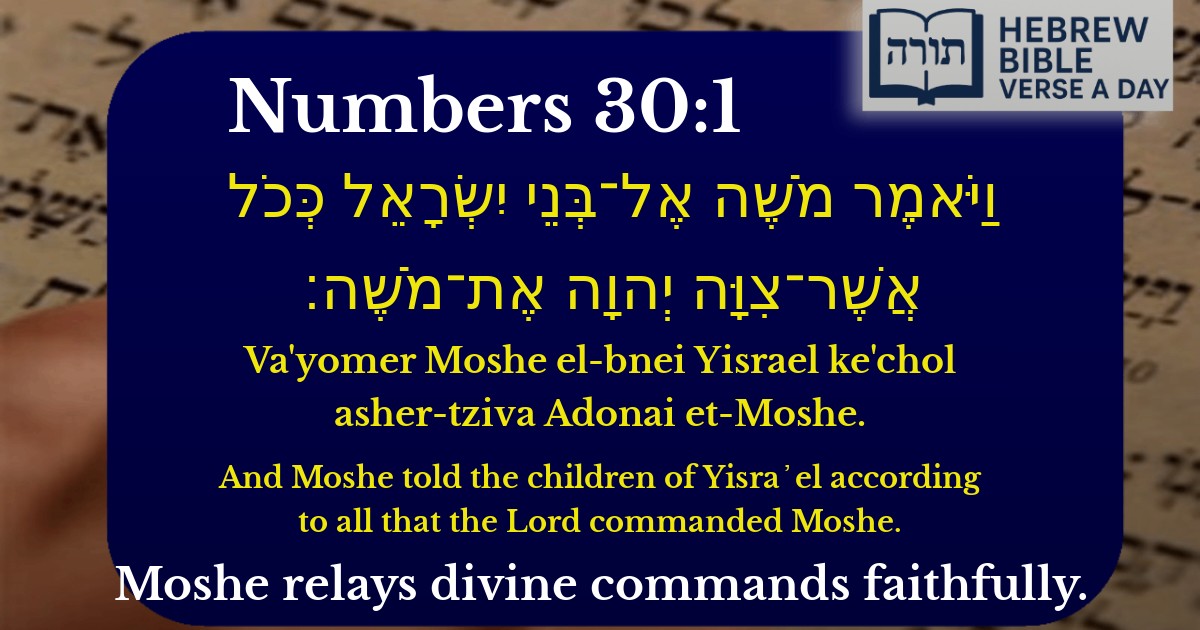Frequently Asked Questions
Q: What does Numbers 30:1 mean?
A: Numbers 30:1 emphasizes that Moshe (Moses) faithfully conveyed all of Hashem's commandments to the children of Israel exactly as he was instructed. This verse introduces the laws of vows (nedarim) and oaths, showing Moshe's role as the faithful transmitter of Torah.
Q: Why is Moshe's role as a messenger important in this verse?
A: Moshe's role is crucial because he serves as the intermediary between Hashem and the Jewish people. Rashi explains that Moshe repeated the commandments precisely without adding or omitting anything, ensuring the integrity of Torah transmission. This sets the foundation for the Oral Torah tradition.
Q: What lesson can we learn from Numbers 30:1?
A: The verse teaches the importance of faithfully transmitting Torah teachings without alteration. The Rambam (Maimonides) highlights this principle in Hilchot Yesodei HaTorah, showing that Moshe's exact transmission ensures the authenticity of Jewish law for all generations.
Q: How does this verse relate to the laws of vows (nedarim)?
A: This verse introduces the section on vows (Numbers 30:2-17), emphasizing that just as Moshe conveyed Hashem's words accurately, we must also take our verbal commitments seriously. The Talmud (Nedarim) discusses the gravity of keeping one's word, as speech has spiritual weight in Judaism.
Q: Why does the verse repeat 'Moshe' twice?
A: The double mention of Moshe ('Moshe told... as Hashem commanded Moshe') underscores his complete faithfulness in transmitting Torah. The Midrash (Sifrei) explains that this repetition reinforces Moshe's unique role as the trusted prophet who conveyed Hashem's will perfectly to Israel.


Understanding the Verse in Context
The verse "וַיֹּאמֶר מֹשֶׁה אֶל־בְּנֵי יִשְׂרָאֵל כְּכֹל אֲשֶׁר־צִוָּה יְהוָה אֶת־מֹשֶׁה" appears in Shemot (Exodus) 35:4, introducing Moshe's transmission of Hashem's commandments regarding the construction of the Mishkan (Tabernacle). This phrase emphasizes Moshe's precise and faithful transmission of divine instruction to Bnei Yisrael.
Rashi's Commentary
Rashi (Exodus 35:4) highlights the phrase "כְּכֹל אֲשֶׁר־צִוָּה יְהוָה" ("according to all that the Lord commanded") to teach that Moshe relayed every detail of Hashem's instructions without omission or alteration. This underscores the principle of שְׁמִירַת הַמִּצְווֹת בְּדִיּוּק (meticulous observance of mitzvot), a foundational concept in halachah.
Rambam's Perspective
Rambam (Maimonides), in Mishneh Torah (Hilchot Yesodei HaTorah 9:1), derives from such verses that a true prophet like Moshe must convey divine commandments without adding or subtracting. This reinforces the authenticity of Moshe's prophecy and the integrity of Torah transmission.
Midrashic Insights
The Midrash Tanchuma (Pekudei 11) connects this verse to the broader theme of כְּלָל וּפְרָט (general and specific commandments). Just as Moshe taught both general principles and fine details, so too must Torah study encompass broad concepts and precise halachic applications.
Halachic Implications
The Sefer HaChinuch (Mitzvah 95) cites this verse when discussing the prohibition against adding to or detracting from mitzvot (Devarim 13:1). Moshe's exact transmission establishes the precedent for preserving Torah law unchanged through the generations.